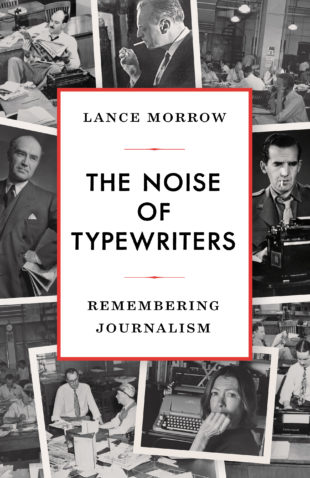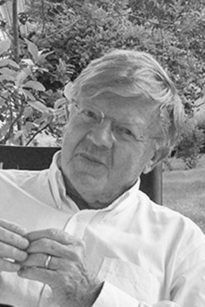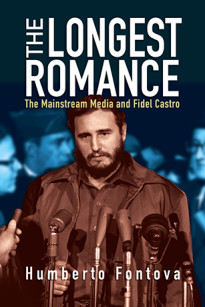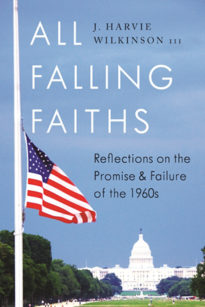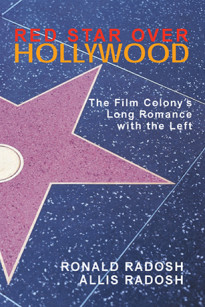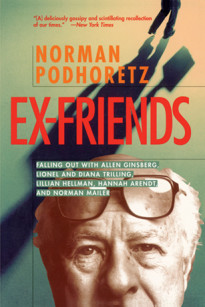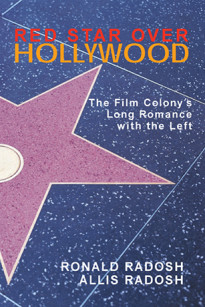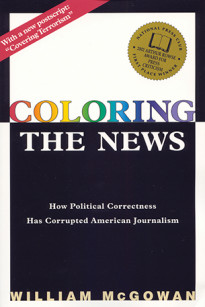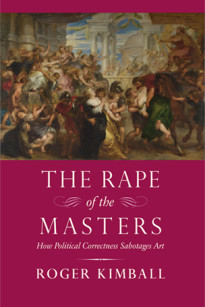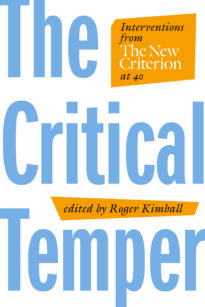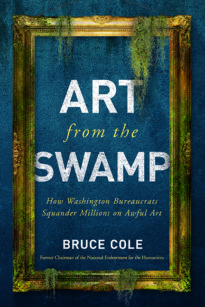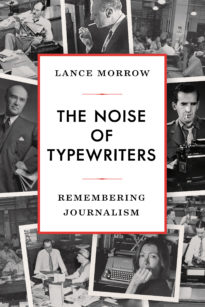Ihave an afterimage of Clark Gable at the bus station in a trench coat, with his crooked smile, his shabby integrity. That, of course, is from It Happened One Night (1934). Frank Capra in his movies in the 1930s created morality plays about American journalism, turning newspaper reporters into Everyman, their consciences an ongoing test of the country’s notion of its emotional reflexes and decencies.
It Happened One Night is a masterpiece of emotional allegories: the entire country seen, for example, as a busload of beleaguered and essentially sweet Americans riding north through a terrific rainstorm in the middle of the night—and all of them singing “The Daring Young Man on the Flying Trapeze.” There was a runaway heiress in the back of the bus with a handsome newspaper reporter, incognito. To be an American was to be like the daring young man on the flying trapeze. The ineffably American thing was a sweetness, an innocence, a vulnerability.* Or to be an American was to be like that spunky little wonder of the 1930s, Shirley Temple—who was another allegory of the time: an innocent, unsinkable child making her way through a bad world.
A curious thing: There was, in the drama of journalism, an implication of childishness, of neoteny almost, as if to say that reporters never quite grew up or that journalism itself never quite learned to act like an adult. Editors, it is true, behaved like irascible father figures—that was the part they were assigned to play—but the reporters by inference were irresponsible children, cases, almost, of arrested development: talented, perhaps, but wayward. Henry Luce was extraordinarily tolerant of alcoholics on the staff of his magazines (Time, Fortune, Life, and others), as if he thought that was the price he had to pay for good writing. Good editing, in Luce’s doctrine, emerged from sobriety, rectitude, and sound judgment—his own missionary father’s virtues; but he was romantic enough to believe that inspired writing originated in some other part of the brain, in the region of eccentricity, recklessness, even paganism or madness. When he was an adolescent, the great press lord Luce had wanted to be a poet. He wasn’t very good at it. He wrote knockoff Masefield (galloping heptameters). I think he remained wistful for all his life about the Byronic possibilities of the world, for which he knew himself to be unfitted.
The picaresque version of journalism in those days proceeded in a sequence of lovable clichés: the hilarities of Ben Hecht and Charles MacArthur’s play The Front Page or its even funnier movie version, His Girl Friday, or, in the British, Fleet Street version, Evelyn Waugh’s Scoop. (The 1938 novel was a cult favorite of college-boy journalists of my generation who gleefully quoted the line from the Daily Beast’s nature columnist: “Feather-footed through the plashy fen passes the questing vole.”) In this rendering, journalism was always ridiculous—but endearingly so. The imbecile press magnate, Lord Copper, asks his foreign editor, “What’s the capital of Japan? Yokohama, isn’t it?” And the foreign editor meekly replies, “Up to a point, Lord Copper.”
Those college-boy journalists had an inside joke:
“President Roosevelt, what did you think of Brideshead Revisited?”
“I hate Waugh! Eleanor hates Waugh!”
Very funny. The joke called me back to the time, in the summer of 1982, when the Israelis under Ariel Sharon besieged Beirut and shelled the city mercilessly for weeks to try to dislodge the PLO, the Palestinian Liberation Organization. A friend of mine, a Time correspondent, told me he survived the bombardment by retreating to the basement of his apartment building and, as the shells rained down, watching episodes of Brideshead Revisited, played over and over again on a VCR.
They were not entirely wrong, the clichés. Journalism was a rascal—a smoker and a drinker—and the life was picaresque: hectic, improvised, although at times as dull as a clerk’s. The pay was bad. You were broke half the time, and often hung over. But you were young enough to enjoy the scruffy mystique and a winking intimacy with big shots—with history itself (which, up close, was apt to look like a bit of a fraud). Did it add up to anything? I wondered. Henry Luce insisted that it did, but Henry Luce—with his money and power and the influence of his Presbyterian conscience upon the middle-class American mind—was a Big Picture man. (Luce believed in capitalizing Big Ideas and once sent a memo to his editors encouraging the practice.) He was certain that everything that fell beneath his gaze must mean something important.
People have forgotten Henry Luce. But he is, in some ways, the key to understanding journalism in the twentieth century. His career raised essential questions—about the nature of journalism, about the politics of storytelling, about the morals of power. Luce was a brilliant American success story—and a cautionary tale.
The journalism I am speaking of owed a lot to the atmosphere of the Great Depression, which was a generation before my time but nonetheless lingered on as folklore—a kind of warning and a moral framework: a lifestyle, an aesthetic.
During the Depression, the reporters were mostly New Dealers, while their publishers were overwhelmingly Republicans. Capra framed his stories around Americans’ anxiety about whether they are Good; they imagined that if they were not Good, they must be Evil. Or anyway, they must be Pretty Bad. At the same time, it became a complicated lesson of the twentieth century, starting in the 1930s, that when people try to be perfect, they turn into fanatics. That was the story in foreign countries—in Russia, in Germany, around the time of It Happened One Night, which got the Oscar for Best Picture in 1934. Could it happen here? Capra liked to show Americans being tempted by an evil genius (often played by Edward Arnold)—a newspaper publisher with a fascist agenda—but, at the end, returning safely to the arms of their sweet democracy, like Dorothy restored to the farm in Kansas. I sometimes think that the leftist tendencies of twenty-first-century media have their origin in the myths of Frank Capra’s movies.
There was a certain amount of decaying theology at work in all of this. In time, the country’s Calvinism—the founding religion—had settled for democratizing itself as a cult of emotions. Feelings—like money—give the country a least common denominator: a lingua franca in which people in a diverse society might communicate with one another and affirm their humanity and their citizenship as Americans. Now, instead of hard theological thoughts, the country moralized its feelings. Almost from the start, the need to justify the American enterprise had produced an elaborately sentimental self-image. The Frank Capra movies (for example, Meet John Doe and Mr. Smith Goes to Washington) were a twentieth-century advance in that art—and so were Norman Rockwell’s anecdotal paintings, the glowing American allegories that illustrated covers of the Saturday Evening Post in the days when it was a great and influential magazine; my father was an editor at the Post in those flush times, after the war. The self-confident and sometimes preacherly and overbearing narratives of Henry Luce’s Time magazine had an immense moral and cultural influence upon Americans. As a child, Luce, a China missionary’s son, learned storytelling from the New Testament, from Christ’s parables—each of which teaches a moral lesson. Stories in his magazines would similarly instruct. Hotchkiss and then Yale exposed him to the moralizing Greeks and Romans, especially Plutarch, who sought the truth of things in the lives of great men.
In any case, mass-circulation American journalism (especially Luce’s) joined American politics and American religion and American movies in the restless project of making and remaking—or, eventually, unmaking—the national myth.
Journalism in the twentieth century proceeded on the assumption that there was such a thing as objective reality. The task of journalism, said Carl Bernstein—who was a companion of my youth, when we were picaresque rascals side by side on the dictation bank at the Washington Evening Star back in the mid-1960s—was to obtain “the best available version of the truth.” But in the writing and editing, objective reality tended to become subjective reality; facts were well enough, but important facts needed to be evaluated, judged—characterized. Which was the priority of a mythmaker like Luce—the hard facts of the case or the storyteller’s interpretation of them, the narrative line? Is journalism inevitably engaged in the working up of myths, whatever its pretensions to objectivity? A journalist needs a disciplined reverence for the facts, because the temptations of storytelling are strong and seductive.
I don’t mean that mythmaking is necessarily perfidious; in any case, it is inevitable. It’s a problem of storytelling and, so to speak, of entertainment. Where journalism is concerned, as I discovered over the years, the narrative line is not only a chronic problem of ethics but the key to culture itself—and even the glue that holds a society together.
But in the era I am writing about, questions like that were above our pay grade. We took it for granted that there was something called the truth and that it could be discovered. Start at the level of the cop’s truth: The victim was either white or black, male or female. The murder weapon was of a certain caliber. Someone had pulled the trigger. Who? I’m talking about hard facts that are beneath the radar of controversy, of politics. Such facts did not invite abstract speculation. Woodward and Bernstein approached Watergate as a crime story, not a political one; they would knock on doors like police detectives and find things out. Woodward and Bernstein were like the boy in the story of the emperor’s new clothes. In Citizen Kane, that great fable of journalism and American truth, an obscure clue like “Rosebud” might mean something. Find out what he meant by that, the editor told his boys in the smoky projection room at the start of the movie.
In the twenty-first century, on the other hand, journalism would find itself plunged into the metaverse. Politics and culture would migrate into the country of myth, with its hallucinations and hysterias—the floating world of a trillion screens. There might come to be no agreed reality at all.
* In the twenty-first century, the American conscience would notice that there were no black people at all aboard the bus—and that fact would set up a ferociously different and opposite narrative line.
